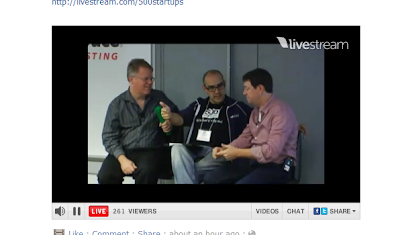 Image via CrunchBase
Image via CrunchBase
We all agree that something fundamental has changed in the way Facebook operates as an information system and in the way it views our human relationships. I don't think that it's just a race to compete with Twitter or Google+ for world domination in the social graph.
Would someone like Mark Zuckerberg be concerned with something as petty as business competition? No, there is a much longer game being played here, and it goes to the core of how we experience reality and use that experience to succeed, thrive and exist in the world.
Facebook smart lists and the subscribe button changes our real world experience in three core ways: 1. How we stay informed of world and local events; 2. How we experience the education system; 3. How we search and discover information and people.
The fundamental changes in design and user control could alter our fundamental understanding of
what is public and what is private.
How Facebook can Personalize Events and Eliminate Your Need for the Nightly News at 10
The most recent change in Facebook eliminates the daisy chain, or telegraphing, of information from one single news event down the line to the millions of people who digest it and process it as news. But on a much deeper level, it gives us a platform of data on which we can, to a granular degree, determine what is similar about one human's experience as it relates to our experience.
In a sense, we have the facts. News of old was about really really good storytelling, and about a general anesthesia called the human experience that meant we had to trust, explicitly, that every human being's experience was just like ours. News banks on this as its currency.
Not more than 45 years ago, American audiences had three main channels to get their nightly news. News was about a brand experience. Our ancestors trusted Walter Cronkite to tell us about the Vietnam War's pitch battles, as it pitted Democracy against Communism, for example. Our forefathers, at the advent of public broadcast television believed in Cronkite and other news anchors as people who could speak cogently and effortlessly to millions of people about singular events that happened 8,000 miles away, experienced by someone we have never met before.
Not only did we have this general anesthetic trust in the humanity of the person who experienced that horrible event, we believed that his experience was also like ours, at a deeply human level. We empathized. If you think about it, how weird is that? Did we really know Lance Corporal Bill Jones? No. But we knew his human experience, and when he died in that firefright in Da Nang, we believed.
With subscription lists, we see a Facebook that is a hybrid of something like Google+ and something like Twitter, and that hypermash is something like a hyperlocal, personalized news feed that mixes the personal with the objective. We, or people like us, are now connected to Lance Corporal Bill Stevens, in Afghanistan. And you know what? War does not look like the black and white news reels sent by satellite to the news desk to be seen by 10pm.
It looks more like X Boxes and foot patrols, bad C-rations and complaints about the
Giants winning the World Series. Now that Facebook has opened up the firehose, so to speak, we can search and find many of these people - a Bob Woodward of the Washington Post and a Private Johnny X from Delaware who is serving in the war.
The creation of subscription lists is the first move towards socializing news in a way that should broaden our sense of what is the human experience. Instead of depending on the nightly anesthesia at 10, we will see for ourselves what people see, think and feel. Since Facebook has the social profile game down pat, when you get your news now, the chances are very high that you are also going to get the private context around that news.
Which should also force changes in the way we learn.
How Facebook Turns Education Into an Experience Rather than a System
Education in the future - heck, it's even happening now - will move from a system of trusting what teacher says, because the teacher gives us the state-mandated tests, to being tested, in a real world sense by the viewpoints and actions of real world people.
Call it socialized education with a real world system for credentials. With so many people, experts even, available to users of the social network, education can fundamentally change from the really old school system of reading textbooks, being tested for recall and proficiency, and inter-classroom competition for grades to something where there is a real world problem, and a crowd of knowledgeable and caring individuals who can rally to the cause and fix it.
Our children could begin to learn through relationships, something reserved, right now, for experiences inside the classroom and the school. We send kids to school in order that they learn how to go to school. We know enough about congnition and learning now to know that systems are really good at running as systems, but they can't be made to teach people to think outside the system. That would ruin the purpose of a system.
Systems sustain themselves.
Imagine a Facebook Education. You have access to millions of realtime experts all over the globe, speaking hundreds of different languages, expressing thought, problems and solutions in multiple angles. That in and of itself is a learning experience.
With carefully edited and monitored barriers of interaction, what teacher would not wish his students to thrive in a real world interaction with the creators of the Three Gorges Dam in China, for example, while backing up those engineering lessons with lessons in Chinese, Physics, culture and other lesson areas through conversations with people who do that work every day?
Which brings us to the final change:
Facebook Is Priming Itself for the Next Great Change in Search, Social Discovery
Someone, everywhere, knows something. How do you find these people?
Smart Lists and Subscriber buttons take us a little bit closer.
I don't know jack about Brooklyn. I live in a small hamlet called Manhattan, surrounded by water. The last time I was in Brooklyn, I was dating someone who lived there. I don't have much reason to go back, if you know what I'm saying. How do I find a really great restaurant, then, if I should even think about getting on the L train and crossing into the world's first city? I ask my friend, N. She lives in Brooklyn.
There is the rub. My relationships fundamentally determine where I go and what I do. I could use an app on my phone to recommend something to me. And do you know what helps that algorithm make those recommendations? My social network has access to so much more information than I do, and suddenly brand names and big Michelin rankings don't mean anything anymore
In this way, you can argue that Facebook is competing with Google for the search portion of social graph. But they have the toehold. They already have nearly 800 million "friends." That's 799 million potential relationships that I could have, in some form or another.
That's a lot of great Thai restaurants in Bangkok, for example, some of which do not have Zagat ratings.
 Image via WikipediaScene: London Underground, 1996. It's winter. A little boy is wrapped up in a plaid wool jacket. His mother holds his hand. She's wearing a violet sweater and a green anorak. Her blondish hair is tied back very loosely in a hair band, and tendrils of her hair spill down her left cheek, which is flushed with the London wind.
Image via WikipediaScene: London Underground, 1996. It's winter. A little boy is wrapped up in a plaid wool jacket. His mother holds his hand. She's wearing a violet sweater and a green anorak. Her blondish hair is tied back very loosely in a hair band, and tendrils of her hair spill down her left cheek, which is flushed with the London wind.

 Posted by
Posted by
 0
comments
0
comments




























